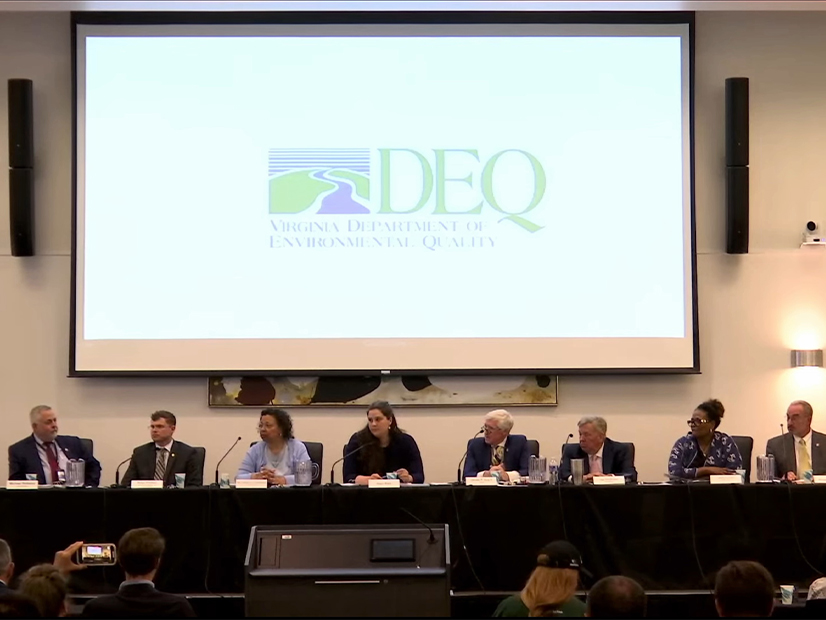
Virginia Gov. Glenn Youngkin’s (R) bid to remove the state from the Regional Greenhouse Gas Initiative (RGGI) passed its final regulatory hurdle as the Air Pollution Control Board narrowly approved ending the state’s participation in the program.
The board voted 4-3 at its meeting Wednesday to repeal the regulation implementing Virginia’s participation in the 11-state cap-and-trade program, a proposal first approved by the board and published for public comment in December. (See Va. Air Panel Votes to Exit RGGI.) Youngkin’s administration argued in a report last March that RGGI constituted a “direct carbon tax” on residents and businesses, saying that none of Virginia’s revenue from the program has been used to provide rebates to customers. (See Youngkin Report: RGGI a ‘Direct Carbon Tax’ on Va. Ratepayers.)
Withdrawing from RGGI was one of Youngkin’s campaign promises, and the governor began the process just hours after taking office through an executive order directing Virginia’s departments of Environmental Quality (DEQ) and Natural Resources to draft emergency regulations that would allow the Air Board to repeal its 2019 rule allowing the state to join.
But even as representatives of Virginia’s energy industry urged the board to pass the measure during the comment section of Wednesday’s meeting, the majority of commenters called the repeal misguided at best and illegitimate at worst.
Only those who submitted comments during the public comment period earlier this year were allowed to address the board; the meeting agenda noted that about 1,600 of the 2,500 comments received were in opposition to the proposal.
Nate Benforado, a senior attorney with the Southern Environmental Law Center, joined many other presenters in arguing that the board was overstepping its authority because Virginia’s participation in RGGI is mandated by a state law passed in 2020.
“The law requires DEQ to issue this regulation in the first place; it mandated this regulation be issued. It used the word ‘shall.’ It’s not optional,” Benforado said, listing instances where the law specified actions to be taken by state regulators. “Does this really sound like a law that … envisions a world in which we are not in RGGI [and] that punted the decision of whether to participate in RGGI … to DEQ or this board? … This is a thorough, comprehensive framework that told DEQ and the other agencies involved exactly what they are required to do.”
William Stiles, executive director of environmental advocacy group Wetlands Watch, echoed Benforado’s argument that “a regulatory body does not have the authority to reverse a legislative decision.” He also put forward an economic case for RGGI, pointing out that participating in the initiative “has generated many hundreds of millions of dollars for Virginia” by providing funding for energy efficiency and flood resilience projects.
“It’s been said that RGGI is a bad deal for Virginia. The bad deal for Virginia was the status quo that existed before RGGI, where the only money available to localities for planning was a few thousand dollars a year out of [the Department of Conservation and Recreation’s] dam safety and floodplain management program,” Stiles said. “So we’re very strongly advocating that we stay in RGGI, not just because you can’t get out of it by regulation, but because of the benefits that it produces.”
Although board members made no response to these points during the meeting — other than to thank the participants for their input — the DEQ did provide rebuttals to public comments in the agenda. The department pushed back on assertions that withdrawing from RGGI by regulatory action was “unlawful,” arguing that its regulation for voluntary participation in the program predated the legislature’s mandate and that no “provision of law [limits] the board’s discretion to repeal the regulation and thereby withdraw from RGGI.”
Regarding the funding for energy efficiency and flood projects, the DEQ pointed out that “RGGI is not the only possible source of funding [or] the most efficient or transparent means of obtaining this type of funding.” Adopting a legalistic argument of its own, the department said that “appropriations and funding distributions for these types of projects are rightly the purview of the General Assembly and not a third-party organization.”

